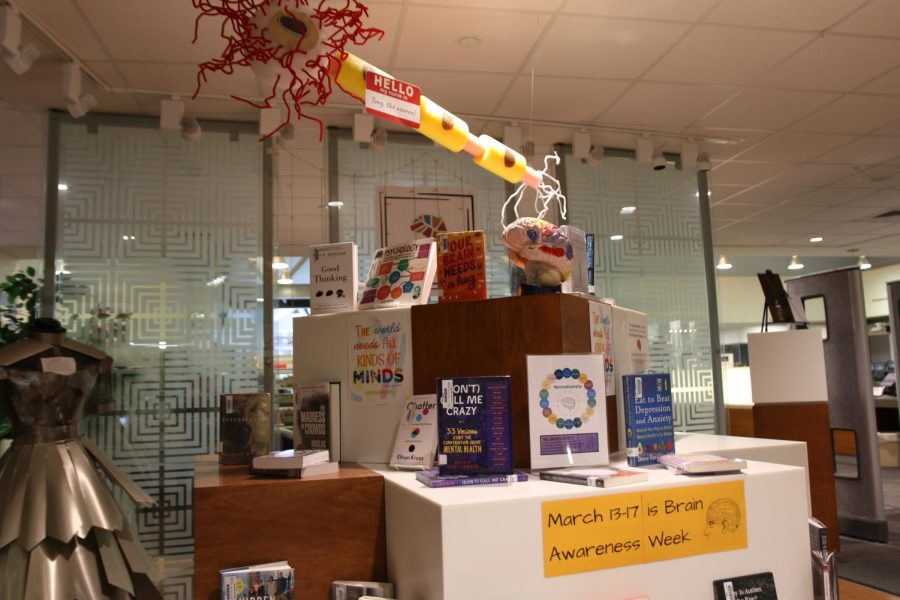Brain Awareness Week Features Student Projects
Media by Willem Hummel
A display in the library features student projects and different books about themes included in Brain Awareness Week, like neuroscience and mental health.
The week before spring break, the library featured the first ever Brain Awareness Week recognized at MHS.
“Brain awareness includes neuroscience, brain health, mental health and psychology,” Brittany Sharitz, librarian, said. “So it’s hitting on both the psychology and science side of things.”
Towards the front of the library, a display featured projects that were created by students, and various books on topics related to the Brain Awareness Week, while in the back of the library there were various brain games students could solve.
“We are hoping that students see all of this variety of information and are interested in picking up a book or learning a little bit more about neuroscience or mental health because it’s a topic that’s really important to everyone,” Sharitz said.
Sharitz said mental health has been on the decline recently.
“I have heard in the news a lot lately that we are in the middle of a teen mental health crisis,” Sharitz said. “We know coming out of the pandemic that there is still a lot of people who are unhappy with the way life is.”
Brain health is greatly connected to overall health and mental health is something to pay attention to, Sharitz said.
Madeline Bowen, senior, is currently in AP Psychology and is one of many students who had items displayed in the library.
Bowen said she made a memory book that listed various definitions and terms from their psychology unit. It explained the terms in a way a 4 year old could understand, like with illustrations and examples of how it would be applied.
In AP Psychology, she said the biggest idea she has learned is that devoting time to do something productive, like exercising, getting more sleep or reaching out to others, can improve mental health.
Bowen said she likes the idea of a Brain Awareness Week because it brings up topics not talked about regularly.
“It makes people be more aware of what’s going on in their own bodies and others bodies to understand themselves and others,” Bowen said.
Alex Pastuzyn, senior, is another student who had a memory book on display in the library.
Pastuzyn said mental illnesses and problems are just as serious as physical injuries, and they should not be neglected.
“A lot of people have this stigma even with things like anxiety or depression that it is something that you can control or something that you can choose to stop,” Pastuzyn said. “What we are learning now is that it’s really not the case, there are so many different chemicals in the brain and genetic and social factors that feed into psychological illness.”
Pastuzyn said the brain games and activities were a good representation of what she has been learning in class.
“That was really interesting because you hear about it in the textbook, and you can kind of understand it conceptually, but going out to see all those different things and see that ‘wow’ your brain really does do that and jump to those conclusions,” Pastuzyn said.
Your donation will support the student journalists of Marquette High School. Your contribution will allow us to purchase equipment and cover our annual website hosting costs. You may become a PATRON by making a donation at one of these levels: White/$30, Green/$50, Blue/$100. Patron names will be published in the print newsmagazine, on the website and once per quarter on our social media accounts.

Willem Hummel, Senior is a News Editor for the Marquette Messenger. This is his third year on staff, he has been involved in the Track Team, and Cross...







